后接动名词的动词
动名词不定式(可以接不定式或动名词的动词大集合)

后只能接动名词作宾语的动词admit 承认/ advise 建议/ allow 允许/ appreciate 感激/ avoid 避免/ consider 考虑/ delay 推迟/ deny 否认/ discuss 讨论/ dislike 不喜欢/ enjoy 喜爱/ escape 逃脱/ excuse 原谅/ fancy 设想/ finish 完成/ forbid 禁止/ forgive 原谅/ imagine 想像/ keep 保持/ mention 提及/ mind 介意/ miss 没赶上/ pardon 原谅/ permit 允许/ practise 练习/ prevent 阻止/ prohibit 禁止/ put off 推迟/ report 报告/ risk 冒险/ stop 停止/ suggest 建议/ carry on 继续/ can’t help 禁不住/ feel like 想要/ give up 放弃/ keep on 继续/ put off 推迟/ set about 开始,着手/ object to 反对/ insist on 坚持/ pay attention to 注意/ stick to 坚持/ get down to 开始认真做/ look forwards to 期盼/ be [get] used to 习惯于/ lead to 导致/ be devoted to 致力于,专用于,后只能接不定式作宾语的动词afford 负担得起/ arrange 安排/ ask 要求/ care 想要/ choose 决定/ decide 决定/ demand 要求/ determine 决心/ expect 期待,预计/ help 帮助/ hesitate 犹豫/ hope 希望/ long 渴望/ manage 渴望设法/ offer 主动提出/ plan 计划/ prepare 准备/ pretend 假装/ promise 答应/ refuse 拒绝/ want 想要/ wish 希望,既可接动名词也可接不定式作宾语但意义不同的动词(1) remember(记得),forget(忘记),regret(后悔)后接不定式指该不定式所表示的动作还未发生,后接动名词(有时可用完成式),则指该动名词所表示的动作已经发生。
动词后接动名词or 不定式用法大全

动词后接动名词or 不定式用法大全习惯后接动名词作宾语的动词admit 承认/ advise 建议/ allow 允许/ appreciate 感激/ avoid 避免/ consider 考虑/ delay 推迟/ deny 否认/ discuss 讨论/ dislike 不喜欢/ enjoy 喜爱/ escape 逃脱/ excuse 原谅/ fancy 设想/ finish 完成/ forbid 禁止/ forgive 原谅/ imagine 想像/ keep 保持/ mention 提及/ mind 介意/ miss 没赶上/ pardon 原谅/ permit 允许/ practise 练习/ prevent 阻止/ prohibit 禁止/ put off 推迟/ report 报告/ risk 冒险/ stop 停止/ suggest 建议/ carry on 继续/ can’t help 禁不住/ feel like 想要/ give up 放弃/ keep on 继续/ put off 推迟/ set about 开始,着手/ object to 反对/ insist on 坚持/ pay attention to 注意/ stick to 坚持/ get down to 开始认真做/ look forwards to 期盼/ be [get] used to 习惯于/ lead to 导致/ be devoted to 致力于,专用于,等。
例句:None of us enjoy getting up early.我们中间没人喜欢早起。
He kept standing during the meeting. 开会时他一直站着。
He advised leaving early. 他建议早点动身。
He suggested going together in one car. 他建议大家一起坐一辆汽车去。
只接动名词的动词

只接动名词的动词miss失去, mind介意, enjoy喜欢, give up放弃, finish完成, avoid避免, practise实践, escape逃跑, stop停止, excuse原谅, delay耽误, require 要求, suggest建议, insist on坚持, can’t help禁不住, complete完成, deny否认, put off推迟, favor赞成,支持, understand明白, risk冒险, keep保持, consider考虑,imagine想象、猜想,fear 害怕,include 包括,suffer痛苦、遭受,report报告,celebrate庆祝prevent阻止。
等。
有些动词后面即可接-ing又可接不定式即permit, allow, encourage, advise, recommend, forbid等一般用动词-ing结构做宾语,但如有自己逻辑主语时要用不定式。
e.g. 1.They don’t allow smoking in the auditorium.礼堂内禁止吸烟。
2.The doctor advised taking exercise.医生劝告要参加锻炼。
3.We don’t permit talking in class.我们不允许在课堂上讲话。
4.They forbid parking here.这儿禁止停车。
5.He permitted me to arrive late, with an excuse.说明了理由,他允许我来晚了。
6.The teacher forbids us to talk in class.老师允许我们上课讲话。
Two:1. I crossed the street to avoid meeting him, but he saw me and came running towards me.我横穿马路以便避开他,但他看到了我并朝我跑过来。
后接动名词的动词

动词形式一、后接动名词的动词admit 承认/ advise 建议/ allow 允许/ appreciate 感激/ avoid 避免/ consider 考虑/ delay 推迟/ deny 否认/ discuss 讨论/ dislike 不喜欢/ enjoy 喜爱/ escape 逃脱/ excuse 原谅/ fancy设想/ finish 完成/ forbid 禁止/ forgive 原谅/ imagine 想像/ keep 保持/ mention 提及/ mind 介意/ miss 没赶上/ pardon 原谅/ permit 允许/ practise 练习/ prevent 阻止/ prohibit 禁止/ put off 推迟/ report 报告/ risk 冒险/ stop 停止/ suggest 建议/ carry on继续/ can’t help 禁不住/ feel like 想要/ give up放弃/ keep on 继续/ put off 推迟/ set about 开始,着手/ object to 反对/ insist on 坚持/ pay attention to 注意/ stick to 坚持/ get down to 开始认真做/ look forwards to 期盼/ be [get] used to 习惯于/ lead to 导致/ be devoted to 致力于,专用于二、后接不定式作宾语的动词afford 负担得起/ arrange 安排/ ask 要求/ care 想要/ choose 决定/ decide 决定/ demand 要求/ determine 决心/ expect 期待,预计/ help 帮助/ hesitate 犹豫/ hope 希望/ long 渴望/ manage 渴望设法/ offer 主动提出/ plan 计划/ prepare 准备/ pretend 假装/ promise 答应/ refuse 拒绝/ want 想要/ wish 希望三、既可接动名词也可接不定式作宾语但意义不同的动词(1) remember(记得),forget(忘记),regret(后悔)后接不定式指该不定式所表示的动作还未发生,后接动名词(有时可用完成式),则指该动名词所表示的动作已经发生。
后接动名词的动词
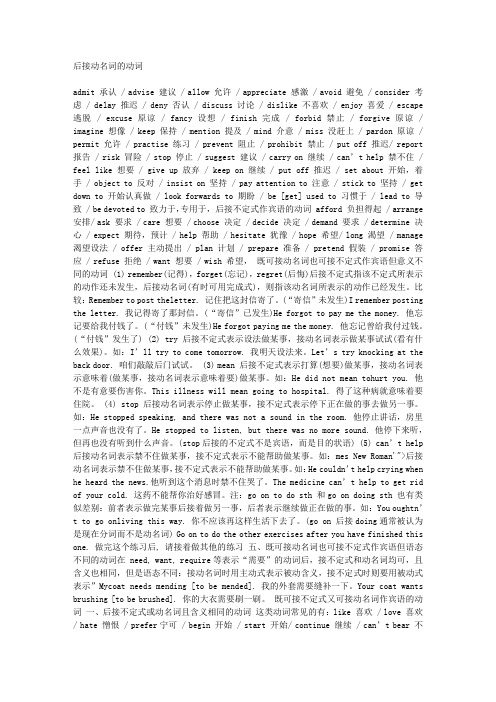
后接动名词的动词admit 承认 / advise 建议 / allow 允许 / appreciate 感激 / avoid 避免 / consider 考虑 / delay 推迟 / deny 否认 / discuss 讨论 / dislike 不喜欢 / enjoy 喜爱 / escape 逃脱 / excuse 原谅 / fancy 设想 / finish 完成 / forbid 禁止 / forgive 原谅 / imagine 想像 / keep 保持 / mention 提及 / mind 介意 / miss 没赶上 / pardon 原谅 / permit 允许 / practise 练习 / prevent 阻止 / prohibit 禁止 / put off 推迟/ report 报告 / risk 冒险 / stop 停止 / suggest 建议 / carry on 继续 / can’t help 禁不住 / feel like 想要 / give up 放弃 / keep on 继续 / put off 推迟 / set about 开始,着手 / object to 反对 / insist on 坚持 / pay attention to 注意 / stick to 坚持 / get down to 开始认真做 / look forwards to 期盼 / be [get] used to 习惯于 / lead to 导致 / be devoted to 致力于,专用于,后接不定式作宾语的动词 afford 负担得起 / arrange 安排/ ask 要求 / care 想要 / choose 决定 / decide 决定 / demand 要求 / determine 决心 / expect 期待,预计 / help 帮助 / hesitate 犹豫 / hope 希望/ long 渴望 / manage 渴望设法 / offer 主动提出 / plan 计划 / prepare 准备 / pretend 假装 / promise 答应 / refuse 拒绝 / want 想要 / wish 希望,既可接动名词也可接不定式作宾语但意义不同的动词 (1) remember(记得),forget(忘记),regret(后悔)后接不定式指该不定式所表示的动作还未发生,后接动名词(有时可用完成式),则指该动名词所表示的动作已经发生。
英语惯用法10动词后接动名词

1.表示“保证”“使相信”或 “说服”的动词
assure, convince, persuade 等
2.表示“通知”,“告诉”, “提醒”或“警告”的动词
admonish(警告), apprise(通知), inform, notify(通知), remind, warn等 如:please apprise them of our safe arrival. Parents admonished her of the dangerous situation.
5.表示“除掉”或“摆脱”的动词
cleanse(清除), clear (清除), disabuse(去掉), disburden(去 掉), disembarrass(使解脱), ease(去 掉,使安心), exorcise(清除), purify (清除), relieve(去掉), rid(去掉), sweep(扫于) get down to (开始) pass on to (转向) plead guilty to (服罪) set one’s mind to (一心做)
with regard/ relation to (关于) with an eye/ view to (着眼于) as to (关于) in reference to (关于)
4.表示“剥夺”或“夺走”的动词 bereave(夺走), denude(剥 去), deprive(剥夺), dispossess(剥夺), divest(剥夺),shear(剥 夺), strip(剥去)等
如: The floods bereaved him of his families. They divested the king of all his power. Don’t strip the tree of its leaves.
动词后面只能接动名词的初中常考14个
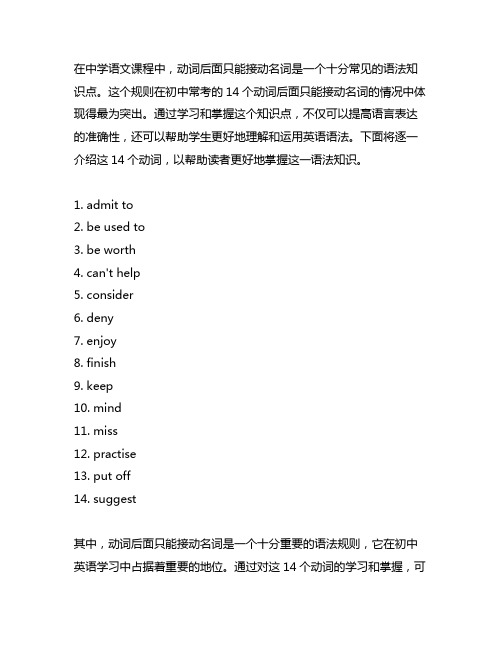
在中学语文课程中,动词后面只能接动名词是一个十分常见的语法知识点。
这个规则在初中常考的14个动词后面只能接动名词的情况中体现得最为突出。
通过学习和掌握这个知识点,不仅可以提高语言表达的准确性,还可以帮助学生更好地理解和运用英语语法。
下面将逐一介绍这14个动词,以帮助读者更好地掌握这一语法知识。
1. admit to2. be used to3. be worth4. can't help5. consider6. deny7. enjoy8. finish9. keep10. mind11. miss12. practise13. put off14. suggest其中,动词后面只能接动名词是一个十分重要的语法规则,它在初中英语学习中占据着重要的地位。
通过对这14个动词的学习和掌握,可以帮助学生更好地运用这一语法知识,提高语言表达的准确性和流利度。
对于中文母语的学生来说,这些动词后面只能接动名词的情况也常常与中文的表达方式不同,需要花费一些时间去适应和掌握。
在学习动词后面只能接动名词的情况时,我们需要注重在实际语境中的运用。
通过大量的练习和反复的操练,可以帮助学生更好地掌握这一语法知识。
老师在教学中也可以通过丰富多样的教学活动和游戏,来帮助学生更好地理解和运用这一知识点。
动词后面只能接动名词的初中常考14个动词,是一个学习英语语法时需要重点掌握的知识点。
通过对这些动词的学习和练习,可以帮助学生提高语言表达的准确性和流利度,更好地理解和运用这一语法规则。
对于中文母语的学生来说,需要花费一定的时间去适应和掌握这一规则,但通过持之以恒的努力,一定能够取得显著的进步。
希望通过本文的介绍和分析,读者能够更深入地理解和掌握这一知识点,从而在英语学习中取得更大的进步。
也希望能够激发读者对英语学习的兴趣,让英语学习成为一件有趣并且有意义的事情。
在学习动词后面只能接动名词的情况时,我们需要注重实际语境中的运用。
动词后接动名词和不定式作宾语的区别

英语教材里后接动名词和不定式作宾语的动词一、有些动词只能接不定式做宾语。
例如:help,hope,ask,refuse,decide,promise,wish,pretend,expect,learn,plan,manage,agree,fail,offer,happen,seem等等。
例如:He refused to speak on the radio.二、有些动词或短语只接动名词做宾语:mind,finish,enjoy,suggest,consider,miss,keep(on),avoid避开,躲开,stand(忍受),allow ,practicegive up,put off,look forward to期待,期望,feel like想要做某事,prevent…from,阻止can't help禁不住,不由自主迫不及待,be/get used to ,be worth doing,be busy doing例如:His wife doesn't allow smoking inside the room and often advised him to give up smoking.I'm looking forward to hearing from you soon.She doesn't feel like eating anything,being ill for a few days.三、有些动词后面既可接不定式,又可接动名词,其意义基本相同,区别不大。
如;like,love,hate,prefer.begin,start.注意:begin和start本身为进行时,或后面动词为心理变化意义的动词时,须接不定式。
例如:When we came in, they were beginning to have supper.After his explanation, I began to understand it / realize that I was wrong.四、有些词后面既可以接不定式.亦可接动名词,但其意义有很大区别,须特别注意:A.remember,forget,接动名词,表示完成意义(=having done),接不定式,表示将来意义:例如:Please remember to bring me the book I want next time. I remember seeing her(=having seen her) somewhere before.B.mean:mean to do=want to do打算,想要……;mean doing:意味着,就是例如:I am sorry, I didn't mean to hurt your feelings,Learning a foreign languagedoesn't mean just working in class.C.stop:stop to do停下来,要干另一件事,不定式作目的状语;stop doing停止干……,动名词作宾语。
动词后接动名词和动词不定式

动词后接动名词和动词不定式某些动词其后既可以接动词不定式,也可以接动名词,但表示的意义不同.不定式一般表示动作尚未发生,而动名词表示动作已经发生于这个动词之前.类候动词有:forget/remember, stop/go on,regret,等等.Forget/remenber doing somthing:记得/忘记做过某事..........I forget turning off the light.我已以关了灯,但却忘了这事.Forget/remenber to do something: 记得/忘记将要做什么..........I remember to cook for you.我记得要给你做饭.stop/go on doing:停止/继续做正在做的事.......stop watching TV停止看电视stop/go on to do:停下来/继续做另外的事(表示目的).......stop to watch TV停下(现在正在做的事)来看电视Regret doing 悔恨做了某事,..........I regret telling you that.我后悔告诉了你那事Tegret to do 遗憾做某事.............I regret to tell you that we cannot to go.遗憾的告诉你我们不能去了有些动词既可接动名词作宾语,也可接不定式,但在语义上却有很大差别。
如:⑴chance to do 碰巧去做某事chance doing 冒险试一试做某事⑵forget to do 忘记要去做某事forget doing 忘记曾做过某事⑶go on to do 接着又做另一件事go on doing 继续做同一件事⑷remember to do 记得要去做某事remember doing 记得曾做过某事⑸stop to do 停下来去做某事stop doing 停止做某事⑹try to do 努力做某事try doing 试一试做某事⑺regret to do 对将要做的事表示遗憾regret doing 对做过的事表示遗憾⑻mean to do 打算/想做某事mean doing 意味着/意思是做某事动词接动名词还是不定式一个及物动词后接另一动词作宾语时,有时只能用不定式,有时只能用动名词,有时用不定式或动名词均可且含义相同,有时用不定式或动名词均可但含义不同。
后接动名词(doing)的动词
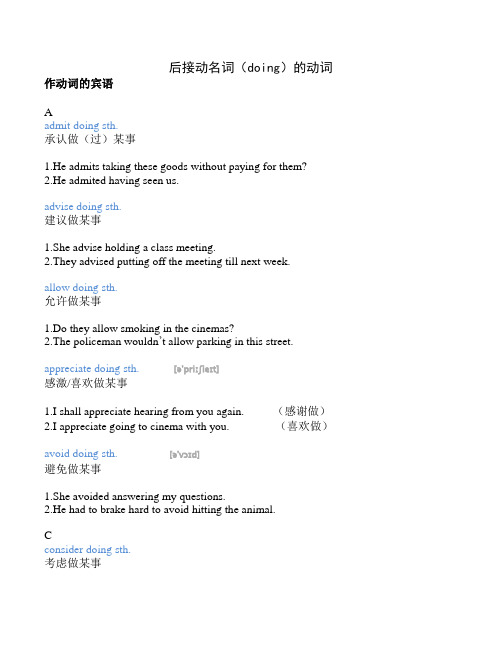
后接动名词(doing)的动词作动词的宾语Aadmit doing sth.承认做(过)某事1.He admits taking these goods without paying for them?2.He admited having seen us.advise doing sth.建议做某事1.She advise holding a class meeting.2.They advised putting off the meeting till next week.allow doing sth.允许做某事1.Do they allow smoking in the cinemas?2.The policeman wouldn’t allow parking in this street. appreciate doing sth. [ə'priːʃieɪt]感激/喜欢做某事1.I shall appreciate hearing from you again. (感谢做)2.I appreciate going to cinema with you. (喜欢做)avoid doing sth. [ə'vɔɪd]避免做某事1.She avoided answering my questions.2.He had to brake hard to avoid hitting the animal.Cconsider doing sth.考虑做某事1.We are considering building a library here.2.He was considering taking the table downstairs.3.I have often considered studying abroad.Ddelay doing sth. [dɪ'leɪ]推迟做某事1.They have delayed opening the new school.2.He delayed fixing the roof although it leaked badly. deny doing sth. [dɪ'naɪ]否认做某事1.He denied knowing anything about their plans.2.Jack denied doing anything illegal.discuss doing sth.讨论/商量做某事1.They discussed selling the house.2.We are discussing buying a new car.Eenjoy doing sth.喜爱做某事1.I enjoy watching films.2.Little boys enjoy reading picture books.escape doing sth. [ɪ'skeɪp]逃脱/避免做某事1.There is no way to escape doing the hard work.2.He was lucky to escape being killed.Ffancy doing sth. ['fænsi]设想/想要做某事1.I don’t fancy going back to that dreary house alone.2.What do you fancy doing?补充:以fancy doing sth 句式呈现的感叹句通常表示惊奇、出乎意料或难以想像。
后面接动名词作宾语的所有动词汇总

后面接动名词作宾语的所有动词汇总Company number:【WTUT-WT88Y-W8BBGB-BWYTT-19998】一、后面接动名词作宾语的所有动词汇总下面的动词要求动名词作宾语:动词+动名词(作宾语)acknowledge承认,自认cease停止mention说到,讲到admit承认tolerate忍受dislike不喜欢,讨厌advocate:提倡,主张complete完成dread可怕appreciate感激,欣赏confess坦白endure忍受avoid避免contemplate细想enjoy享有,喜爱bear忍受defer拖延envy嫉妒can'thelp不禁delay延迟escape逃跑,逃避can'tstand受不了deny否认excuse借口consider考虑detest嫌恶fancy幻想,爱好favor造成,偏爱mind介意repent悔悟figure描绘,计算miss错过resent怨恨finish完成,结束不得pardon原谅,饶恕resist抵抗,阻止forgive原谅permit允许resume恢复imagine设想postpone延迟,延期risk冒险involve卷入,包含practise实行,实践suggest建议hate讨厌prevent阻止save营救,储蓄keep保持quit放弃停止stand坚持,忍受loathe非常讨厌,厌恶recall回想例如:Iappreciatehavingbeengiventheopportunitytostudyabroadtwoyearsago.我很感激两年前给我出国学习的机会.(3)有些动词后使用动名词和动词不定式作宾语的差别(1)forgettodo忘记要去做某事(此事未做)forgetdoing忘记做过某事(此事已做过或已发生)2)stoptodo停止中断(某件事),目的是去做另一件事stopdoing停止正在或经常做的事3)remembertodo记住去做某事(未做)rememberdoing记得做过某事(已做)4)regrettodo对要做的事遗憾regretdoing对做过的事遗憾、后悔5)trytodo努力、企图做某事trydoing试验、试一试某种办法6)meantodo打算,有意要…meandoing意味着7)goontodo继而(去做另外一件事情)goondoing继续(原先没有做完的事情)8)proposetodo打算(要做某事)proposingdoing建议(做某事)9)like/love/hate/prefer+todo表示具体行为;+doingsth表示抽象、倾向概念(注)如果这些动词前有should一词,其后宾语只跟不定式,不能跟动名词.例如:Ishouldliketoseehimtomorrow.10)need,want,deserve+动名词表被动意义;+不定式被动态表示“要(修、清理等)”意思.Don'tyourememberseeingthemanbefore你不记得以前见过那个人吗Youmustremembertoleavetomorrow.你可要记着是明天动身.Idon'tregrettellingherwhatIthought.我不后悔给她讲过我的想法.(已讲过)Iregrettohavetodothis,butIhavenochoice.我很遗憾必须这样去做,我实在没办法.(未做但要做)Youmusttrytobemorecareful.你可要多加小心.Let'strydoingtheworksomeotherway.让我们试一试用另外一种办法来做这工作.Ididn'tmeantohurtyourfeeling.我没想要伤害你的感情. Thisillnesswillmean(your)goingtohospital.得了这种病(你)就要进医院.(一)动名词与不定式的区别动名词起名词作用,在句子中可以作主语、宾语、表语、定语、主语补足语、宾语补足语.不定式起名词、形容词、副词作用,在句子中除了动名词所起的作用外,还可以作状语.但两者之间也有差别:1.不定式的逻辑主语必须与主语一致,而动名词的逻辑主语范围较大,它可以指主语,也可以是泛指.如:Ihatetoworkonweekends.我讨厌周末干活.(指自己干活)Ihateworkingonweekends.我讨厌周末干活.(可以指自己,也可以泛指)2.动名词多指抽象的、概念性的动作,可以是多次的、经常的行为;不定式多表示具体的动作,尤其是某一次的动作.如:Readinginbedisapleasure.躺着看书是一种乐趣. IlikeswimmingbutIdon'tliketoswiminthepooltoday.我喜欢游泳,但是今天我不喜欢在游泳池里游泳.试比较:Playingwithfireisdangerous.玩火危险.(泛指玩火)Toplaywithfirewillbedangerous.玩火会发生危险.(指一具体的动作)Talkingforhoursismoreexhaustingthanyouthink.一连讲几小时的话会比你想像的要累.(泛指讲话)Totalkforhoursismoreexhaustingthanyouthink.一连讲几小时的话可比你想像的要累.(指个人感受)3.在某些动词之后只能用动名词,而另一些动词之后只能用不定式.常后接动名词的动词有:admit,avoid,consider,defer(推迟,延期),delay,deny,dislike,enjoy,escape,fancy,finish,imagine,include,keep, mind,miss,postpone(推迟,延期),practise,recall,recollect,resent,resist,risk,stop,suggest等〇常后接动名词短语动词有havedone,giveup等.常后接不定式的动词有:afford,agree,aim,ask,claim,choose,decide,decline,demand,desire,determin e,expect,fail,hope,manage,offer,plan,pretend,promise,refuse,resolve,threa ten,wish等.4.有不少动词既可后接动名词也可接不定式.常见的有begin,continue,dread,fear,forget,goon,hate,help,intend,leam,like,love,mea n,need,neglect,proceed,propose,regret,remember,start,stop,try,want等.这些动词后接的动名词与不定式在意义上往往没有什么区别.但有时两者的意义却有不同:(1)remember和forget后接不定式时,表示没有发生的动作,而接动名词时,表示已经发生过的动作.如:Irememberdoingthatthing.我记得做过那件事. Iremembertodothatthing.我记着要去做那件事. IforgottolockmydoorwhenIlefttheroom.当我离开房间时,我忘记锁门了. IforgotlockingmydoorwhenIlefttheroom.我忘记了我离开房间时已把门锁上了.(2)stop接动名词,表示“停止正在做的事”;stop后接不定式表示“停下来去做某事”,该不定式不是宾语,而是目的状语.如:You'dbetterstopsmoking.你最好不要吸烟了. Stoptolistentotheteacher.停下来听老师讲.(3)try接不定式,表示“努力做某事”;try接动名词,表示“尝试做某事”.如:Trytodoitagain,you'llfinishit.努力再试一次,你就会完成的. TheytryreadingthestoryinEnglish.他们试着用英语读那个故事.(4)regret后接不定式时,指将来或现在的动作;regret后接动名词时,指过去或现在的动作;regret后接动名词的完成式时,指过去的动作.如:Iregrettellingyouthebadnews.我后悔把这个坏消息告诉你. IregrettosayI'munabletohelpyou.很抱歉我不能帮助你.(5)help后接动名词意谓“避免”,help后接不定式意为“帮助”.如:Ican'thelplaughing.我不禁笑起来.Ican'thelptocleanuptheplace.我不能帮忙打扫这地方.(6)mean后接动名词意为“意味着”,mean后接不定式意为“打算”.如:Doingmorningexercisesmeansgettingupearly.做早操意味着要早起. Imeanttohelpyou.我意在帮你.5.有些动名词的主动式可表达被动意义,而不定式则须用其被动式表达被动意义.如:我不堪被人想念.Iwon'tbearthinkingof.Iwon'tbeartobethoughtabout.它需要修理.Itneedsrepairing.Itneedstoberepaired.6.有些动词在书面语中后多接动名词,在口语中后多接不定式.如:开始下雨了.Itstartedraining.Itstartedtorain.我害怕冒犯她.Ifearoffendingher.Ifeartooffendher.7.在should(would)like,love等之后须用不定式.如:I'dliketothankyouagain.我愿再次感谢你.I'dlovetocomesometime.日后我愿意来的.。
后接动名词(doing)的动词
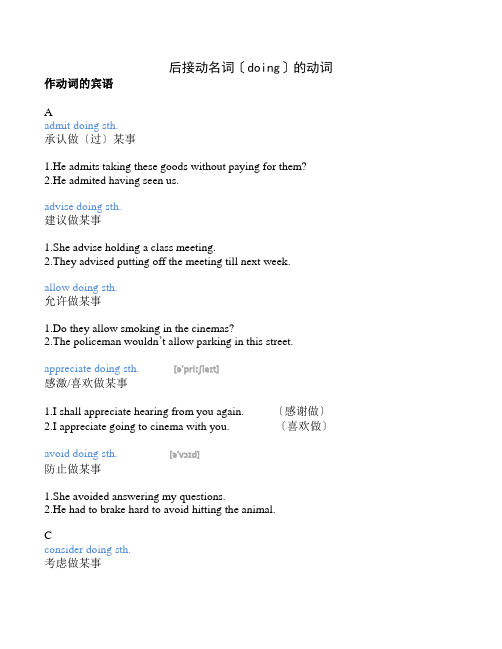
后接动名词〔doing〕的动词作动词的宾语Aadmit doing sth.承认做〔过〕某事1.He admits taking these goods without paying for them?2.He admited having seen us.advise doing sth.建议做某事1.She advise holding a class meeting.2.They advised putting off the meeting till next week.allow doing sth.允许做某事1.Do they allow smoking in the cinemas?2.The policeman wouldn’t allow parking in this street. appreciate doing sth. [ə'priːʃieɪt]感激/喜欢做某事1.I shall appreciate hearing from you again. 〔感谢做〕2.I appreciate going to cinema with you. 〔喜欢做〕avoid doing sth. [ə'vɔɪd]防止做某事1.She avoided answering my questions.2.He had to brake hard to avoid hitting the animal.Cconsider doing sth.考虑做某事1.We are considering building a library here.2.He was considering taking the table downstairs.3.I have often considered studying abroad.Ddelay doing sth. [dɪ'leɪ]推迟做某事1.They have delayed opening the new school.2.He delayed fixing the roof although it leaked badly. deny doing sth. [dɪ'naɪ]否认做某事1.He denied knowing anything about their plans.2.Jack denied doing anything illegal.discuss doing sth.讨论/商量做某事1.They discussed selling the house.2.We are discussing buying a new car.Eenjoy doing sth.喜爱做某事1.I enjoy watching films.2.Little boys enjoy reading picture books.escape doing sth. [ɪ'skeɪp]逃脱/防止做某事1.There is no way to escape doing the hard work.2.He was lucky to escape being killed.Ffancy doing sth. ['fænsi]设想/想要做某事1.I don’t fancy going back to that dreary house alone.2.What do you fancy doing?补充:以fancy doing sth 句式呈现的感慨句通常表示惊奇、出乎意料或难以想像。
后面接动名词作宾语的所有动词汇总

一、后面接动名词作宾语的所有动词汇总下面的动词要求动名词作宾语:动词+动名词(作宾语)acknowledge承认,自认cease 停止mention说到,讲到admit 承认tolerate忍受dislike不喜欢,讨厌advocate:提倡,主张complete完成dread可怕appreciate 感激,欣赏confess坦白endure忍受avoid避免contemplate细想enjoy享有,喜爱bear忍受defer拖延envy嫉妒can't help不禁delay延迟escape逃跑,逃避can't stand受不了deny否认excuse借口consider 考虑detest嫌恶fancy幻想,爱好favor 造成,偏爱mind 介意repent悔悟figure描绘,计算miss错过resent怨恨finish完成,结束不得pardon原谅,饶恕resist抵抗,阻止forgive原谅permit 允许resume恢复imagine设想postpone延迟,延期risk冒险involve卷入,包含practise 实行,实践suggest建议hate讨厌prevent阻止save营救,储蓄keep保持quit放弃停止stand坚持,忍受loathe非常讨厌,厌恶recall回想例如:I appreciate having been given the opportunity to study abroad two years ago.我很感激两年前给我出国学习的机会.(3)有些动词后使用动名词和动词不定式作宾语的差别(1)forget to do 忘记要去做某事(此事未做)forget doing忘记做过某事(此事已做过或已发生)2)stop to do 停止中断(某件事),目的是去做另一件事stop doing 停止正在或经常做的事3)remember to do 记住去做某事(未做)remember doing记得做过某事(已做)4) regret to do对要做的事遗憾regret doing对做过的事遗憾、后悔5)try to do努力、企图做某事try doing试验、试一试某种办法6) mean to do打算,有意要…mean doing意味着7)go on to do 继而(去做另外一件事情)go on doing 继续(原先没有做完的事情)8)propose to do 打算(要做某事)proposing doing建议(做某事)9) like /love/hate/ prefer +to do 表示具体行为;+doing sth 表示抽象、倾向概念(注)如果这些动词前有should一词,其后宾语只跟不定式,不能跟动名词.例如:I should like to see him tomorrow.10) need, want, deserve +动名词表被动意义;+不定式被动态表示“要(修、清理等)”意思.Don't you remember seeing the man before?你不记得以前见过那个人吗?You must remember to leave tomorrow.你可要记着是明天动身.I don't regret telling her what I thought.我不后悔给她讲过我的想法.(已讲过)I regret to have to do this, but I have no choice.我很遗憾必须这样去做,我实在没办法.(未做但要做)You must try to be more careful.你可要多加小心.Let's try doing the work some other way.让我们试一试用另外一种办法来做这工作.I didn't mean to hurt your feeling.我没想要伤害你的感情.This illness will mean (your) going to hospital.得了这种病(你)就要进医院.(一)动名词与不定式的区别动名词起名词作用,在句子中可以作主语、宾语、表语、定语、主语补足语、宾语补足语.不定式起名词、形容词、副词作用,在句子中除了动名词所起的作用外,还可以作状语.但两者之间也有差别:1. 不定式的逻辑主语必须与主语一致,而动名词的逻辑主语范围较大,它可以指主语,也可以是泛指.如:I hate to work on weekends. 我讨厌周末干活.(指自己干活)I hate working on weekends. 我讨厌周末干活.(可以指自己,也可以泛指)2. 动名词多指抽象的、概念性的动作,可以是多次的、经常的行为;不定式多表示具体的动作,尤其是某一次的动作.如:Reading in bed is a pleasure. 躺着看书是一种乐趣.I like swimming but I don't like to swim in the pool today. 我喜欢游泳,但是今天我不喜欢在游泳池里游泳.试比较:Playing with fire is dangerous. 玩火危险.(泛指玩火)To play with fire will be dangerous. 玩火会发生危险.(指一具体的动作)Talking for hours is more exhausting than you think. 一连讲几小时的话会比你想像的要累.(泛指讲话)To talk for hours is more exhausting than you think. 一连讲几小时的话可比你想像的要累.(指个人感受)3. 在某些动词之后只能用动名词,而另一些动词之后只能用不定式. 常后接动名词的动词有:admit, avoid, consider, defer (推迟,延期),delay,deny, dislike,enjoy,escape, fancy,finish,imagine,include,keep,mind,miss,postpone (推迟,延期),practise,recall,recollect,resent, resist, risk, stop, suggest等〇常后接动名词短语动词有have done, give up等.常后接不定式的动词有:afford, agree, aim, ask, claim,choose,decide, decline, demand, desire, determine, expect, fail, hope, manage, offer, plan,pretend, promise, refuse, resolve, threaten,wish等.4. 有不少动词既可后接动名词也可接不定式.常见的有begin,continue, dread,fear,forget,go on, hate, help, intend, leam, like, love, mean, need, neglect, proceed, propose, regret, remember, start, stop, try, want等.这些动词后接的动名词与不定式在意义上往往没有什么区别.但有时两者的意义却有不同:(1) remember和forget后接不定式时,表示没有发生的动作,而接动名词时,表示已经发生过的动作.如:I remember doing that thing. 我记得做过那件事.I remember to do that thing. 我记着要去做那件事.I forgot to lock my door when I left the room. 当我离开房间时,我忘记锁门了.I forgot locking my door when I left the room. 我忘记了我离开房间时已把门锁上了.(2) stop接动名词,表示“停止正在做的事”;stop后接不定式表示“停下来去做某事”,该不定式不是宾语,而是目的状语.如:You'd better stop smoking. 你最好不要吸烟了.Stop to listen to the teacher. 停下来听老师讲.(3)try接不定式,表示“努力做某事”;try接动名词,表示“尝试做某事”.如:Try to do it again, you'll finish it. 努力再试一次,你就会完成的.They try reading the story in English. 他们试着用英语读那个故事. (4) regret后接不定式时,指将来或现在的动作;regret后接动名词时,指过去或现在的动作;regret后接动名词的完成式时,指过去的动作.如:I regret telling you the bad news. 我后悔把这个坏消息告诉你.I regret to say I'm unable to help you. 很抱歉我不能帮助你.(5)help后接动名词意谓“避免”,help后接不定式意为“帮助”.如:I can't help laughing. 我不禁笑起来.I can't help to clean up the place. 我不能帮忙打扫这地方.(6)mean后接动名词意为“意味着”,mean后接不定式意为“打算”.如:Doing morning exercises means getting up early. 做早操意味着要早起.I meant to help you. 我意在帮你.5. 有些动名词的主动式可表达被动意义,而不定式则须用其被动式表达被动意义.如:我不堪被人想念.I won't bear thinking of.I won't bear to be thought about.它需要修理.It needs repairing.It needs to be repaired.6. 有些动词在书面语中后多接动名词,在口语中后多接不定式.如:开始下雨了.It started raining.It started to rain.我害怕冒犯她.I fear offending her.I fear to offend her.7. 在should (would) like, love等之后须用不定式.如:I'd like to thank you again. 我愿再次感谢你.I'd love to come sometime. 日后我愿意来的.。
英语中哪些动词后跟动名词

appreciate(感激),understand, insist on, look forward to,get downto,
devote oneself to, prefer…to… object to (反对), put off, apologize to sb.
for,
give up,
forgive sb. for, be worth, be fond of, be good at, be slow in, be active
in,
be afraid of, be tired of, be busy, succeed in,
prevent/stop/keep sb. from, spend time (in), have difficult/trouble in,
跟不定式(to do)作宾语的动词:
want, wish, hope, manage, pretend, decide, learn, agree, expect, demand,
long, ask,
care, choose, dare, fail, offer, plan, prepare, promise, refuse, desire,
It’s no use/good,
be pround of, instead of.
happen,
appear, intend, would like to, be said to,
B.跟动名词(doing)作宾语的动词:
suggest, admit, finish, avoid, mind, enjoy, delay, practice, excuse sb.
后接动名词的动词Verbs Followed by Gerunds
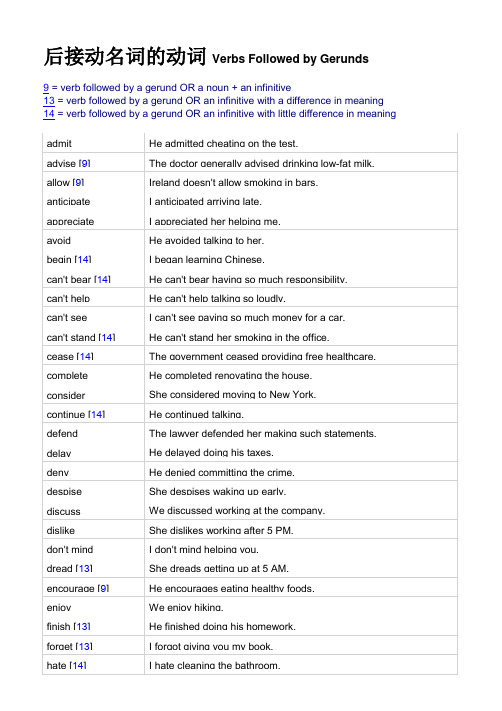
He can't help talking so loudly.
can't see
I can't see paying so much money for a car.
can't stand [14]
He can't stand her smoking in the office.
recommend
Tony recommended taking the train.
regret [13]
She regretted saying that.
remember [13]
I remember telling her the address yesterday.
report
He reported her stealing the money.
start [14]
He started studying harder.
stop [13]
She stopped working at 5 o'clock.
suggest
They suggested staying at the hotel.
tolerate
I tolerated her talking.
hate [14]
I hate cleaning the bathroom.
imagine
He imagines working there one day.
involve
The job involves traveling to Japan once a month.
keep
She kept interrupting me.
动词后接动名词和动词不定式
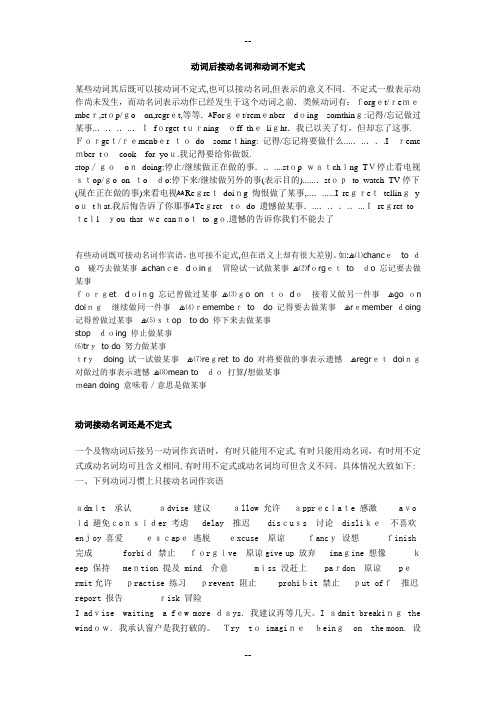
动词后接动名词和动词不定式某些动词其后既可以接动词不定式,也可以接动名词,但表示的意义不同.不定式一般表示动作尚未发生,而动名词表示动作已经发生于这个动词之前.类候动词有:forget/remember,stop/go on,regret,等等.ﻫForget/remenber doing somthing:记得/忘记做过某事..........Iforget turningoff thelight.我已以关了灯,但却忘了这事.Forget/remenber todo something: 记得/忘记将要做什么..........Ireme mber tocook for you.我记得要给你做饭.stop/goondoing:停止/继续做正在做的事.......stop watching TV停止看电视stop/go on todo:停下来/继续做另外的事(表示目的).......stopto watch TV停下(现在正在做的事)来看电视ﻫﻫRegretdoing 悔恨做了某事,..........I regrettellingy outhat.我后悔告诉了你那事ﻫTegret todo 遗憾做某事.............Iregret to tellyou that we cannotto go.遗憾的告诉你我们不能去了有些动词既可接动名词作宾语,也可接不定式,但在语义上却有很大差别。
如:ﻫ⑴chanceto do碰巧去做某事ﻫchance doing冒险试一试做某事ﻫ⑵forgettodo 忘记要去做某事forget doing 忘记曾做过某事ﻫ⑶go on todo接着又做另一件事ﻫgo on doing继续做同一件事ﻫ⑷rememberto do 记得要去做某事ﻫremember doing 记得曾做过某事ﻫ⑸stop to do 停下来去做某事stopdoing 停止做某事⑹tryto do 努力做某事trydoing 试一试做某事ﻫ⑺regret to do 对将要做的事表示遗憾ﻫregretdoing对做过的事表示遗憾ﻫ⑻mean todo打算/想做某事mean doing 意味着/意思是做某事动词接动名词还是不定式一个及物动词后接另一动词作宾语时,有时只能用不定式,有时只能用动名词,有时用不定式或动名词均可且含义相同,有时用不定式或动名词均可但含义不同。
- 1、下载文档前请自行甄别文档内容的完整性,平台不提供额外的编辑、内容补充、找答案等附加服务。
- 2、"仅部分预览"的文档,不可在线预览部分如存在完整性等问题,可反馈申请退款(可完整预览的文档不适用该条件!)。
- 3、如文档侵犯您的权益,请联系客服反馈,我们会尽快为您处理(人工客服工作时间:9:00-18:30)。
定式或动名词含义不同 动词 mean 接不定式作宾语时,表示一种意图,意思是“打算做,想要做”;接动名词作宾语时,表示解释,意思是“意味着,意思是”。如:”I didn’t mean to bother you. 我本不想打扰你。What he said means going thereby air. 他的话的意思是坐飞机去那儿。 四、try后接不定式或动名词含义不同 try 接不定式作宾语时,表示一种决心,意思是“设法做,尽力做”;接动名词作宾语时,表示尝试,意思是“试着做”。如:I’ll try to catch up withmy class. 我将尽力赶上同学们。I tried reading the text without consulting my dictionary. 我试着不查词典来阅读课文。 五、need, require, want, deserve后接不定式或动名词语态不同 need, require, want, deserve 等表示“需要”的动词后另一动词作宾语时,该动词用不定式或动名词均可,但是其语态不同,即动名词用主动形式表示被动意义,而不定式则用被动形式表示被动意义。如:The flowers need watering every day. = The flowers need to be watered every day. 花儿需要每天浇水。注意:若 need, require, want后接动词为句子主语所发出的动作,则只能用不定式,不能用动名词。如:I need to water the flowers every day. 我需要每天给花浇水。 六、can’t help后接不定式或动名词含义不同 can’t help 后接不定式时,意思是“不能帮忙做某事”;接动名词作宾语时,意思是“禁不住做某事,情不自禁做某事”。如:I’mvery busy now, so I can’t help (to) clean the room. 我现在很忙,因此不能帮助打扫房间。The girl couldn’t help cryingwhen she saw her mother again.当小女孩再次看到母亲时,她情不自禁地哭了起来。说明:以下两个动词后接不定式或动名词(不一定是用作宾语)意思也不同:go on to do sth (做完某事后)继续做另一事) (不定式作状语)go on doing 继续做一直在做的事 (动名词作状语)stop to do sth 停下正在做的事以便去做另一事 (不定式作状语)stop doing sths) 停做正在做的事 (动名词作宾语) 一、只能后接不定式的动词和短语归纳有的动词后只能用不定式而不能接动名词。 如ask, demand(要求), plan, intend, mean(计划), manage, do/ try one’s best, make an attempt, (努力), learn(学习), wish, hope, desire, expect, long, want, would like, shouldlike, would prefer(), wish,希望、愿意), agree, promise(同意), decide, determine, choose, make a decision, make up one’s mind(决定), offer(主动提出), apply(申请), help(帮助), fail(不能、没有), prepare(准备), pretend(假装), refuse(拒绝), happen(碰巧), aff事,接不定式表示不能帮助做某事。如:He couldn’t help crying when he heard the news.他听到这个消息时禁不住哭了。The medicine can’t help to get rid of your cold. 这药不能帮你治好感冒。注:go on to do sth 和go on doing sth 也有类似差别:前者表示做完某事后接着做另一事,后者表示继续做正在做的事。如:You oughtn’t to go onliving this way. 你不应该再这样生活下去了。(go on 后接doing通常被认为是现在分词而不是动名词) Go on to do the other exercises after you have finished this one. 做完这个练习后, 请接着做其他的练习 五、既可接动名词也可接不定式作宾语但语态不同的动词在 need, want, require等表示“需要”的动词后,接不定式和动名词均可,且含义也相同,但是语态不同:接动名词时用主动式表示被动含义,接不定式时则要用被动式表示”Mycoat needs mending [to be mended]. 我的外套需要缝补一下。Your coat wants brushing [to be brushed]. 你的大衣需要刷一刷。 既可接不定式又可接动名词作宾语的动词 一、后接不定式或动名词且含义相同的动词 这类动词常见的有:like 喜欢 / love 喜欢 / hate 憎恨 / prefer宁可 / begin 开始 / start 开始/ continue 继续 / can’t bear 不能忍受 / bother 麻烦 / intend 想要 / attempt 试图 / cease 停止,等。如: He likes travelling [to travel] alone. 他喜欢单独旅行。He began doing[to do] this job last year. 他去年开始做这工作。Don’t bother to get [getting]dinner for me. 请不必费事为我做饭了。注意:当 like, love, hate, prefer 与 would, should 连用时,其后只能接不定式。如:I’dlike to drop in and see you tonight. 我想今晚来看你。另外,当 begin, start 本身为进行时态或后接 know, realize, understand 等静态动词时,其后的动词只能用不定式。如:He is beginning to work in that company. 他即将开始去那个公司工作。After the talk with his English teacher, he began to like English. 跟英语老师谈话之后,他开始喜欢英语了。 二、forget, remember, regret 后接不定式或动名词含义不同后接不定式或动名词含义不同 动词 forget, remember, regret 等接不定式时,表示非谓语动词的动作发生于谓语动词的动作之后;接动名词作宾语时,表示非谓语动词的动作发生于谓语动词的动作之前。如:I forgot to tell you about it. 我忘记告诉你那件事了。I remembered giving the book to Li Lei, but he said I didn’t. 我记得我把书给李蕾了,但是他说我没有给。此外,动词 forget, remember, regret 等接动名词、接动名词的完成式或不定式的完成式作宾语时,意义相同。如:I regretted to have broken the rules of our class.= I regretted having broken the rules of our class. 我后悔违反了班规。 三、mean后接不
后接动名词的动词.txt
后接动名词的动词
admit 承认 / advise 建议 / allow 允许 / appreciate 感激 / avoid 避免 / consider 考虑 / delay 推迟 / deny 否认 / discuss 讨论 / dislike 不喜欢 / enjoy 喜爱 / escape 逃脱 / excuse 原谅 / fancy 设想 / finish 完成 / forbid 禁止 / forgive 原谅 / imagine 想像 / keep 保持 / mention 提及 / mind 介意 / miss 没赶上 / pardon 原谅 / permit 允许 / practise 练习 / prevent 阻止 / prohibit 禁止 / put off 推迟/ report 报告 / risk 冒险 / stop 停止 / suggest 建议 / carry on 继续 / can’t help 禁不住 / feel like 想要 / give up 放弃 / keep on 继续 / put off 推迟 / set about 开始,着手 / object to 反对 / insist on 坚持 / pay attention to 注意 / stick to 坚持 / get down to 开始认真做 / look forwards to 期盼 / be [get] used to 习惯于 / lead to 导致 / be devoted to 致力于,专用于, 后接不定式作宾语的动词 afford 负担得起 / arrange 安排/ ask 要求 / care 想要 / choose 决定 / decide 决定 / demand 要求 / determine 决心 / expect 期待,预计 / help 帮助 / hesitate 犹豫 / hope 希望/ long 渴望 / manage 渴望设法 / offer 主动提出 / plan 计划 / prepare 准备 / pretend 假装 / promise 答应 / refuse 拒绝 / want 想要 / wish 希望, 既可接动名词也可接不定式作宾语但意义不同的动词 (1) remember(记得),forget(忘记),regret(后悔)后接不定式指该不定式所表示的动作还未发生,后接动名词(有时可用完成式),则指该动名词所表示的动作已经发生。比较:Remember to post theletter. 记住把这封信寄了。(“寄信”未发生)I remember posting the letter. 我记得寄了那封信。(“寄信”已发生)He forgot to pay me the money. 他忘记要给我付钱了。(“付钱”未发生)He forgot paying me the money. 他忘记曾给我付过钱。(“付钱”发生了) (2) try 后接不定式表示设法做某事,接动名词表示做某事试试(看有什么效果)。如:I’ll try to come tomorrow. 我明天设法来。Let’s try knocking at the back door. 咱们敲敲后门试试。 (3) mean 后接不定式表示打算(想要)做某事,接动名词表示意味着(做某事,接动名词表示意味着要)做某事。如:He did not mean tohurt you. 他不是有意要伤害你。This illness will mean going to hospital. 得了这种病就意味着要住院。 (4) stop 后接动名词表示停止做某事,接不定式表示停下正在做的事去做另一事。如:He stopped speaking, and there was not a sound in the room. 他停止讲话,房里一点声音也没有了。He stopped to listen, but there was no more sound. 他停下来听,但再也没有听到什么声音。(stop后接的不定式不是宾语,而是目的状语) (5) can’t help后接动名词表示禁不住做某事,接不定式表示不能帮助做某事。如:mes New Roman'">后接动名词表示
